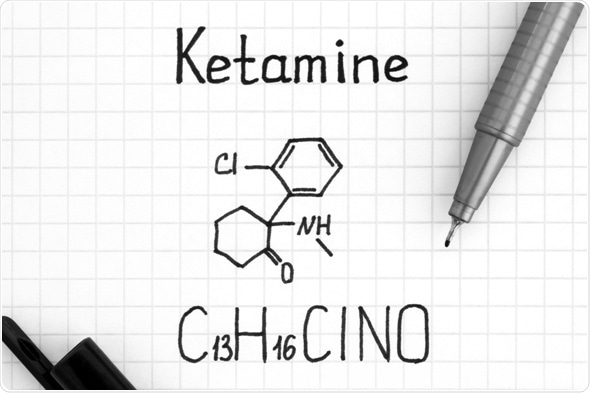Ketamine’s reputation as an antidepressant is restored; it’s not an opioid.

Ketamine has gotten a bad rap as an opioid when there’s plenty of evidence suggesting it isn’t one, Johns Hopkins experts say. They believe this reputation may hamper patients from getting necessary treatment for the kinds of depression that don’t respond to typical antidepressants.
In a new paper, the researchers clarify the mechanism behind ketamine’s mechanism of action in hopes of restoring the therapy’s standing among health care professionals and the public.
In March of this year, the U.S. Food and Drug Administration approved ketamine as a nasal spray to treat depression.
A study done late last year delivered a black eye to ketamine, and as a result of the coverage, there was a wholesale acceptance by both potential patients and physicians that ketamine is an opioid. This is most worrisome if people continue to think this way, particularly in the wake of the opioid epidemic; clinicians won’t refer patients for a treatment, despite that it has been shown to be incredibly effective for many patients with treatment-resistant depression.”
Adam Kaplin, M.D., Ph.D., assistant professor of psychiatry and behavioral sciences at the Johns Hopkins University School of Medicine
The researchers published their viewpoint and explanation of the alternative mechanism as a Letter to the Editor in the May 1 issue of The American Journal of Psychiatry.
Naltrexone — the drug used to reverse accidental opioid overdoses — binds to opioid receptors on the surface of brain cells and prevents opioids like morphine or heroin from sticking to them and acting on the brain, preventing the high.
In late 2018, researchers at Stanford University and Palo Alto University showed that naltrexone also blocks the antidepressant effects of ketamine, which led them to propose that ketamine must also bind to the same opioid receptors and thus concluded that ketamine must be an opioid. Kaplin says that there’s plenty of contrary evidence demonstrating that ketamine sticks to an entirely different receptor on brain cells: the NMDA receptors — involved in learning and memory — instead of the opioid receptors.
He, proposes how this works:
Normally, NMDA receptors get turned on when the chemical messenger glutamate binds to them. Turning on the NMDA receptors turns off a master control switch in the cell called mTOR, which ultimately results in learning a behavior or forming a new memory.
Ketamine can also bind to the NMDA receptors, but it has the opposite effect of glutamate, in that it turns these receptors off. Turning off the NMDA receptors turns on the master control switch mTOR, which is required for ketamine’s antidepressant properties.
Separately, says Kaplin, opioid receptors are normally turned on at low-levels all the time, even without opioids to turn them on all the way. This low activity of the opioid receptors normally suppresses the level of another chemical messenger called cyclic AMP (cAMP). When the overdose drug naltrexone is administered, it sticks to the opioid receptors, turning them completely off, which releases the brakes on cAMP.
This increase in cAMP is what then interferes with the master switch mTOR, shutting it down. When ketamine is taken, it turns on the master switch mTOR to enable antidepressant effects, but if naltrexone is given on top of that, naltrexone obstructs and shuts off the mTOR again. It is through cAMP that naltrexone overrides and extinguishes the antidepressant effects of ketamine.
These NMDA receptors are found together with the opioid receptors on brain cells, and Kaplin says it’s no surprise that their components can meddle with one another, like interference picked up on a phone call or on the radio.
This interference and cross-talk does not mean that ketamine is an opioid, and to wrongly label it as such could eventually keep patients from essential antidepressant medications that could make a huge difference in their quality of life.”
Adam Kaplin
The FDA specified that ketamine is to be administered under the watch of physicians in small doses and in a health care setting to minimize any chance of abuse. The drug works much faster than other traditional antidepressants on the market, sometimes even after one or two uses.
Kaplin and his team are in the process of setting up their own ketamine clinic at Johns Hopkins, which they anticipate will be opening within the next year.
Mike Wang was also an author on the paper.
Wang and Kaplin received grant funding from Janssen.
Kaplin is the co-founder of Reward Pathways and a consultant for Biogen, EMD Serono and Pear Therapeutics.
Source:
Journal reference:
Wang, B. & Kaplin, A. (2019) Explaining Naltrexone’s Interference With Ketamine’s Antidepressant Effect. The American Journal of Psychiatry. doi.org/10.1176/appi.ajp.2019.19010044